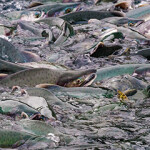Namibia fishing rights auction ends in disappointment

Namibia’s much awaited auction of government-held fishing rights – held to raise funds to contain the coronavirus pandemic – has ended in disappointment after the sale attracted bids for 1.3 percent of the USD 38 million (EUR 32.3 million) that were on offer, according to a report quoting Finance Minister Iipumbu Shiimi.
The auction, which was targeting foreign fishing vessels and operators, would have seen Namibia offload 60 percent of state fishing quota of horse mackerel, hake, and monk, obtained off the country’s coast, to the highest bidder.
The quota, also referred to as Government Objective Fish Quota, was previously reserved for state-owned firm National Fishing Corporation of Namibia (FISHCOR) and included 72,000 metric tons (MT) of horse mackerel, 11,000 MT of hake, and 392 MT of monk. The government had reserved 40 percent of the fishing rights for locals.
However, although NAD 628 million (EUR 32 million USD 37.7 million) of the bids submitted were accepted, a mere NAD 8.4 million (EUR 429,000 USD 504,495) was paid to the government.
Minister Shiimi attributed the poor performance of the fishing rights auction to the high number of speculators submitting bids.
"In the future, punitive measures will be introduced including requirements for payment guarantees or bid securities before participation in the auction," Shiimi said.
Namibia, which by 5 October had reported nearly 12,000 COVID-19 cases with 127 deaths, had planned to utilize the fishing rights auction’s proceeds for the acquisition of equipment and drugs for coronavirus pandemic control efforts.
"We do not produce medicines in Namibia nor do we manufacture medical equipment,” Fisheries Minister Albert Kawana said in August. “Therefore we are forced to compete for medicines and medical equipment on the international market."
The failed fishing rights auction, which was intended to generate foreign currency to support the battle against COVID-19, came months after the International Monetary Fund warned of risks to Namibia’s economy on the back of a possible “decline in global growth as COVID-19 virus risks materialize, and possible lower-than-expected Southern African customs Union (SACU) revenue and fiscal slippages that would undermine the government’s effort to stabilize public debt dynamics.”
Photo courtesy of the Namibia Press Agency






Share